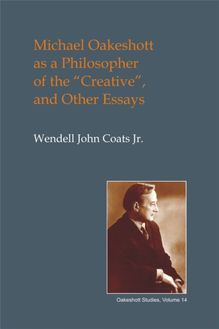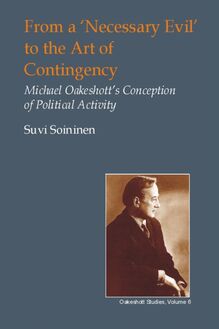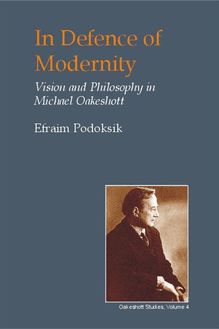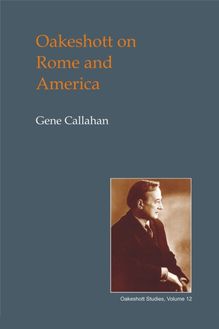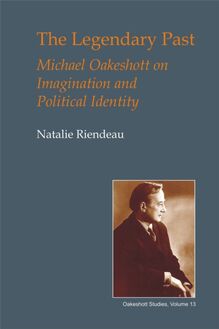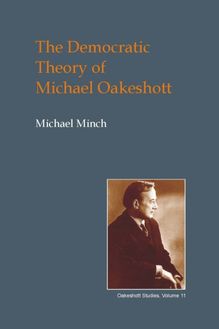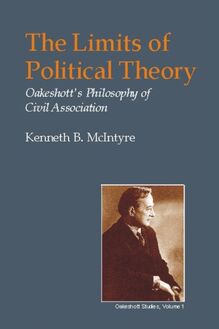Intimations Pursued , livre ebook
144
pages
English
Ebooks
2016
Vous pourrez modifier la taille du texte de cet ouvrage
Obtenez un accès à la bibliothèque pour le consulter en ligne En savoir plus
Découvre YouScribe en t'inscrivant gratuitement
Découvre YouScribe en t'inscrivant gratuitement
144
pages
English
Ebooks
2016
Vous pourrez modifier la taille du texte de cet ouvrage
Obtenez un accès à la bibliothèque pour le consulter en ligne En savoir plus
Publié par
Date de parution
07 juin 2016
Nombre de lectures
3
EAN13
9781845405267
Langue
English
Publié par
Date de parution
07 juin 2016
Nombre de lectures
3
EAN13
9781845405267
Langue
English
Title Page
INTIMATIONS PURSUED
The Voice of Practice in the Conversation of Michael Oakeshott
Andrew Sullivan
imprint-academic.com
Publisher Information
Published in the UK by
Imprint Academic
PO Box 200, Exeter
EX5 5YX, UK
Digital edition converted and distributed by
Andrews UK Limited
www.andrewsuk.com
Copyright © 2007, 2016 Andrew Sullivan
The moral rights of the authors have been asserted. No part of this publication may be reproduced in any form without permission, except for the quotation of brief passages in criticism and discussion.
The opinions expressed herein are those of the authors and do not necessarily reflect those of Imprint Academic or Andrews UK.
Dedication
For my mother and father
British Idealist Studies Series 1: Oakeshott
1: Roy Tseng, The Sceptical Idealist
2: Luke O’Sullivan, Oakeshott on History
3: Ian Tregenza, Michael Oakeshott on Hobbes
4: Efraim Podoksik, In Defence of Modernity
5: Kenneth McIntyre, The Limits of Political Theory: Oakeshott’s Philosophy of Civil Association
6: Suvi Soininen, From a ‘Necessary Evil’ to an Art of Contingency: Michael Oakeshott’s Conception of Political Activity
7: Glenn Worthington, Religious and Poetic Experience in the Thought of Michael Oakeshott
8: Kevin Williams, Education and the Voice of Michael Oakeshott
9: Eric S. Kos, Michael Oakeshott, the Ancient Greeks, and the Philosophical Study of Politics
10: Andrew Sullivan, Intimations Pursued
imprint-academic.com/idealists
Series Editor:
Noël O’Sullivan, University of Hull
Editorial Board:
Wendell John Coats Jr. (Connecticut)
Richard Flathman (Johns Hopkins)
Paul Franco (Bowdoin)
Robert Grant (Glasgow)
John Gray (European Institute, LSE)
John Kekes (SUNY, Albany)
Kenneth Minogue (LSE)
Terry Nardin (Wisconsin)
Lord Parekh (Hull)
atrick Riley (Harvard)
Acknowledgements
The dissertation on which this book is based would have been made much more difficult without the generous financial assistance of the Commonwealth Fund of New York and Harvard University.
It is also fair to say that without the following people, in varying degrees and capacities, the dissertation would not have been written the way it was, or when it was: Josiah Lee Auspitz, Daniel Bell, Richard B. Friedman, Timothy Fuller, Bonnie Honig, Mark Lilla, Stephen Macedo, Harvey C. Mansfield Jr, David Maple, Martin Peretz, Patrick Riley, Michael Sandel, Judith N. Shklar, Joseph Smith, the late T.E. Utley, Leon Wieseltier and Michael Oakeshott.
Abbreviations
EM - Experience and Its Modes (1933)
RP - Rationalism in Politics and other essays (1962)
OHC - On Human Conduct (1975)
OH - On History and other essays (1983)
VLL - The Voice of Liberal Learning (1989)
Quote
If Dante breathes on me his awful breath,
I rise and go: but I am sad as death -
I go: but, turning, who is that I see?
I whisper: - ‘Ariosto, wait for me!’
T.E. Brown, Dante and Ariosto
Preface
To publish a dissertation almost two decades old requires something of an explanation. The explanation is more pressing given the vast amount of previously unpublished work by Michael Oakeshott that has been made available to scholars since. My dissertation was, at the time, only the third yet in existence. It relied solely on the published material available in 1989, and Oakeshott scholarship twenty years ago was a fragment of what it has subsequently become. There was close to no secondary literature to master - merely the original texts themselves.
This book, then, is a very early foray in what is now, happily, a crowded field. It tackled no existing debates - because few were engaged in them. And re-reading it today, I am struck by the almost naive simplicity of the project. I set out very simply to understand the thought of Michael Oakeshott by reading everything he had ever published. I was not intending to become an academic. My goal was merely to explore as thoroughly as I could a thinker who expanded my own mind as I attempted to follow the brilliant flourishes and architecture of his. I had no point to prove; no thesis to settle. I just wanted to understand his mind better; to see the world more clearly for having explored it through his extraordinarily original and erudite eyes. It was an adventure - conducted purely for its own sake. In that sense, I think Oakeshott approved of its spirit. And I found it impossible to read him as thoroughly and as carefully as I did without finding myself converted to his sense of mischief and wonder at the world.
The focus on practice as a mode of experience sprang naturally out of Oakeshott’s own published emphases, although his mind never contented itself with any single area of human conduct. I hope the singularity of this focus is mitigated by the exhaustive nature of the materials I absorbed and tried to understand. No book review or minor scribbling was too trifling to be integrated into the wider whole in this study. And, all these years later, I am struck by how some of the asides in Oakeshott’s minor work shed real and often clarifying light on his more ambitious and dense essays. His asides are worth as much as others’ treatises.
The superb work done by a new generation of Oakeshott scholars is, of course, essential to understanding his contribution to political philosophy. But one of the gratifying elements of the writing of such insightful scholars as Glenn Worthington, Corey Abel, Paul Franco, Tim Fuller, Elizabeth Corey, Effi Podoksik, Ian Tregenza, and Jesse Norman is that their more developed understanding of Oakeshott’s thought helps confirm this dissertation’s early insistence on religion as a core concern of Oakeshott. Later scholars have been able to draw on much more material on this subject than was available to me, and to do so with a narrower and deeper focus; but much of it has tended to echo this book’s contention that a religious doctrine is the key to unlocking Oakeshott’s view of the perfection of practical life among human beings. In recently re-examining contemporary Oakeshott scholarship, I was more than a little gratified that this hunch of mine has been so thoroughly and engagingly developed beyond the sketch of Chapter 5.
I was never a student of Oakeshott but he read this dissertation in both draft and finished form and responded with typical generosity and charm. Its description of the deep, long and unresolved tension between theory and practice in Oakeshott’s work - and its not uncritical examination of the strains and stresses within it - was acknowledged by Oakeshott himself in correspondence. The ‘holes’ I had detected were not, he averred, unknown to him. They were and are, I suspect, part of the point. Oakeshott’s work is not a systematic thesis; it is not a hermetic treatise; it is, like all essay-writing, an invitation to go further, to continue the conversation of which Oakeshott was such a master. Its own tensions invite curiosity, not dismissal.
Toward the end of my year’s study, I was lucky to meet the man whose work I had been exhaustively studying. It is a day I won’t forget, but it is in subsequent years that his influence and impact have truly deepened. As a working journalist - a profession he disdained - I have long found his delicate, fine and mischievous voice beckoning from beyond the charms of daily news and opinion. As the years go by, I find myself returning to his writing again and again; his essays, like Montaigne’s, do not fade; his faith, like Augustine’s, continues to fascinate. His spirit of curiosity, of open-mindedness, and of humour lives on in the minds and souls of his students in ways rarely achieved by modern academics. And reading him - overhearing him think - quite simply changed my life.
I am immensely grateful to Noël O’Sullivan, Ivo Mosley and Keith Sutherland who urged me to go forward and publish this small volume. It is the tribute of a young, eager mind to an older, deeper soul. In awe and great fondness.
Andrew Sullivan
Washington DC, November 2007
Prologue
Probably there has been no theory of the nature of the world, of the activity of man, of the destiny of mankind, no theology or cosmology, perhaps even no metaphysics, that has not sought a reflection of itself in the mirror of political philosophy. And certainly there has been no fully considered politics that has not looked for its reflection in eternity. [1]
Michael Oakeshott (1901–1990), former Cambridge University tutor, editor of the Cambridge Review, professor at the London School of Economics, wrote two major books of philosophy: the first Experience and its Modes, in 1933, the second, On Human Conduct, in 1975. A collection of his essays, Rationalism in Politics and Other Essays, published in 1962, brought him the most fame, and remains the work with which most readers and students of political philosophy are familiar. He has also written, however, a major study of the philosophy of history, On History and Other Essays (1983), a series of essays on education, The Voice of Liberal Learning (1989), edited a classic edition of Hobbes’ Leviathan (1946) and produced close to 200 reviews. There remains a substantive quantity of unpublished material. [2]
The scope of his writing, its ambitions, and its undisputed erudition might make Oakeshott seem one of a handful of pre-eminent political philosophers of the twentieth century. Yet he has been, at least until very recently, peculiarly ignored by both politicians and philosophers alike. He is known as a ‘conservative’ and yet he has never received any official recogni

